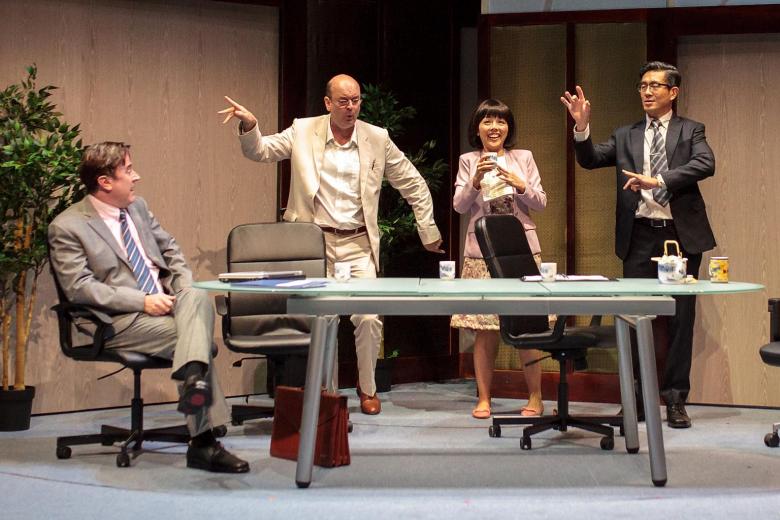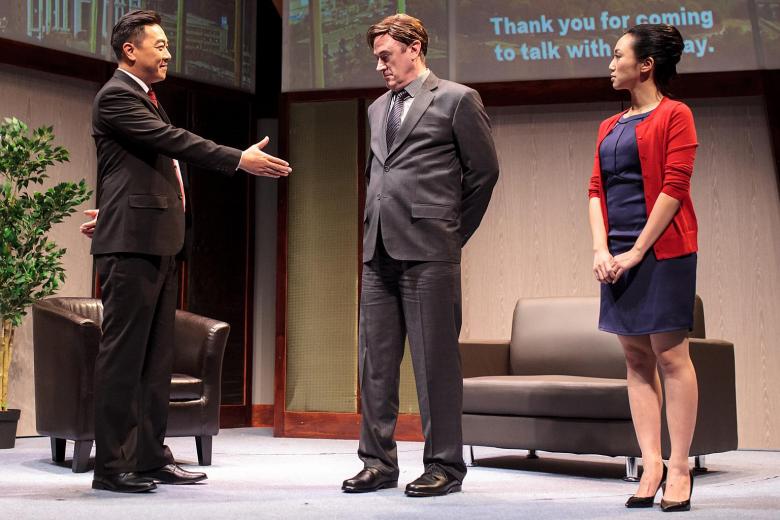CHINGLISH by Pangdemonium
Drama Centre Theatre/Saturday
Admit it - we've all laughed at those signs. "Slip and fall down carefully." "Please don't touch yourself, let us help you to try out." Or even: "F*** the certain price of goods".
The messy mistranslations of Chinese into English take centre stage in American writer David Henry Hwang's 2011 play Chinglish, while also examining the slip-ups that happen on an intercultural level. Being lost in translation gains a whole new meaning when you're not just navigating the mechanics of language, but the soul of a country.
Pangdemonium's very competent production follows the journey of the hapless Daniel Cavanaugh (Daniel Jenkins), the owner of a small family-run signage business in Ohio, as he travels to China to try to expand the struggling company's business network. In Guiyang, he meets a blustering culture minister (Adrian Pang), his scheming vice- minister (Oon Shu An, a bewitchingly funny femme fatale), a Briton who's lived in China so long he is fluent in its language and its ways (Matt Grey), an ambitious magistrate (Guo Liang) and a trio of bewildering translators (Audrey Luo hamming it up in multiple roles).
All the sharp jokes are delivered with zing, but Hwang's script, however riddled with clever punchlines, does not quite go beyond a superficial "we don't understand each other" summary of East-West relationships. It is a very accessible play, one that might even work better in Singapore than in Broadway, given the local audience's familiarity with the use of surtitles or fluency in multiple languages. With a basic knowledge of Mandarin, many more of the play's subtler jokes and enjoyable wordplay come to light.
But while an American audience might appreciate the play as a lighthearted primer to America's flirtation with China, "guanxi" and all, I think Singapore has moved beyond that cursory relationship to something much more complex. Chinglish aims to be a gentle modern-day farce, but still ends up feeling slightly dated as it stuffs itself full of snappy references to current affairs and turns to the lecturing morality play in the end.
One of the script's problems is that it alternates gleeful caricaturisation of its characters and witty banter with showy, declarative monologues and sombre exchanges that feel as though they have come from another play altogether. It can't quite decide if it is going for the quick sketch or the realistic portrait, and ends up being neither.
The culture minister, for instance, seems to fit the bumbling Chinese authority figure archetype (the limited knowledge of American geography, the shirking on the job, the interrupting mobile phone) but is suddenly shoehorned into a more serious situation towards the end with zero characterisation in-between, meaning that we sympathise with him less.
The hardworking cast does their best with a demanding amount of accent work. Oon and Pang, in particular, enunciate their Mandarin so carefully that they become the very definition of "chi li" (literally, "eating strength"; a task so strenuous it eats away at your strength) - while seasoned Mandarin speakers Guo and Luo ooze effortlessness. It did make me wonder why Pangdemonium hadn't cast anyone else from Singapore's wealth of excellent Mandarin performers for just a touch more authenticity.
But it's a commendable effort all the same, and a good enough one to present the dichotomy between the English speakers and the Mandarin speakers in the play and the chasm they must cross. Extra credit must go to Grey, a non-Mandarin speaker who learnt an impressive amount of Mandarin for the show and speaks it with confidence.
Buoyed by a solid cast who show great affection for their characters, Chinglish tries to move us from laughing at mistranslations to learning to love them. And we do, but perhaps the lesson to be learnt here could strive to be greater than the easy laughter and the pat tying up of loose ends. Chinglish is a delight when it is light on its toes, but drags its feet when it is back on the ground.
Follow Corrie Tan on Twitter @CorrieTan
Chinglish is sold out.



